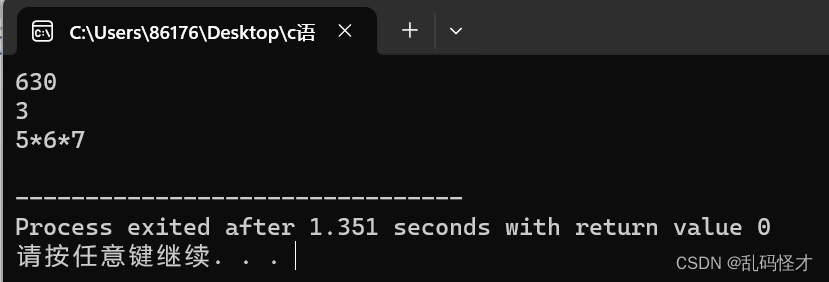题目描述
一个正整数 N 的因子中可能存在若干连续的数字。例如 630 可以分解为 3×5×6×7,其中 5、6、7 就是 3 个连续的数字。给定任一正整数 N,要求编写程序求出最长连续因子的个数,并输出最小的连续因子序列。
输入格式:
输入在一行中给出一个正整数 N(1<N<
)。
输出格式:
首先在第 1 行输出最长连续因子的个数;然后在第 2 行中按
因子1*因子2*……*因子k的格式输出最小的连续因子序列,其中因子按递增顺序输出,1 不算在内。
输入样例:
630输出样例:
3 5*6*7
程序代码
#include <stdio.h>
#include<math.h>
int main() {int N;scanf("%d", &N);int max_count = 0; // 最长连续因子的个数int start_num = 0; // 最小连续因子序列的起始数字for (int i = 2; i < sqrt(N)+1; i++) {int x = 1;int count = 0;//统计每一次循环的连续因子个数for (int j = i; ; j++) {x=x*j;if(N % x !=0)break;elsecount++;}if (max_count<count) {max_count = count;start_num = i;}}if(max_count==0){printf("1\n%d",N);return 0;}printf("%d\n", max_count);for (int i = 0; i < max_count; i++) {printf("%d", start_num + i);if (i < max_count - 1) {printf("*");}}printf("\n");return 0;
}运行结果








使用说明书(五,轻量级的visionpro))






)

)

)
